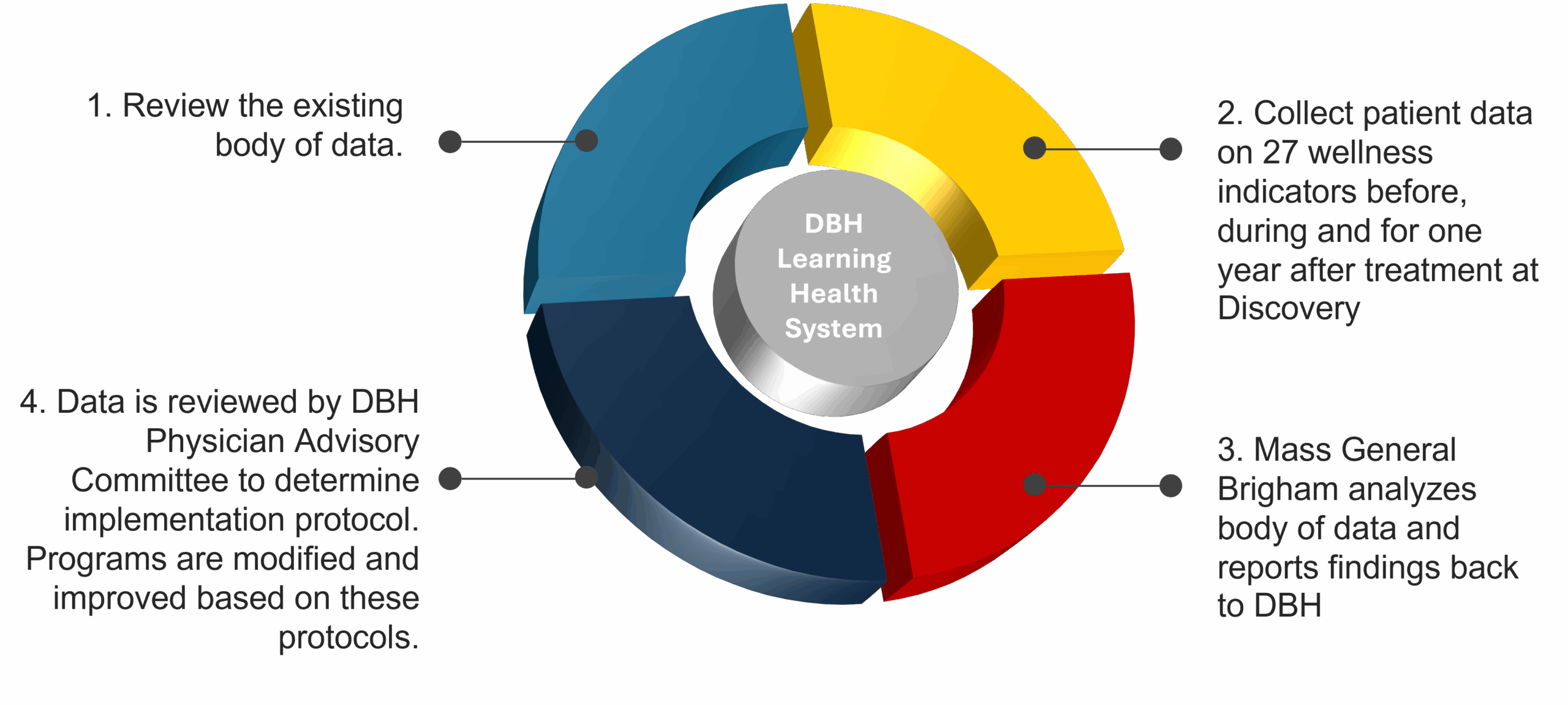 The Vision. In 2018, Discovery Behavioral Health President and CEO John Peloquin, PhD, saw what others in the behavioral health field had long overlooked: without an established standard of care, patient relapse rates had remained stubbornly unchanged for decades—30% for eating disorders, 60% for mental health disorders, and up to 85% for substance use disorders.
The Vision. In 2018, Discovery Behavioral Health President and CEO John Peloquin, PhD, saw what others in the behavioral health field had long overlooked: without an established standard of care, patient relapse rates had remained stubbornly unchanged for decades—30% for eating disorders, 60% for mental health disorders, and up to 85% for substance use disorders.
With a doctorate in Decision Science, Peloquin knew that measurement-based care, data analytics, and technology could radically change this picture. He believed behavioral healthcare could, and must, become a system that learns from itself—constantly improving to deliver better outcomes. The tools weren’t fully there yet, but the vision was.
Data Collection. He began with what was possible: measuring care before and after treatment. Within two years, Discovery’s then Director of Alumni Relations, Rachel Wood, PhD, helped bring the vision closer to reality. Partnering with Videra Health, Wood helped develop a post-discharge platform powered by AI and machine learning. This innovation, called Discovery365, assessed and monitored patients for a full year after treatment—the “high-risk” stage when relapse was most likely—and alerted live support teams when patients showed signs of struggle. For the first time, recovery could extend beyond discharge, reduce and possibly prevent relapse. Longitudinal data began to accumulate.
Validation. Data without clinical validation would not be enough. In 2022, Peloquin recruited Matt Ruble, MD, a Harvard-educated psychiatrist and researcher with established relationships at Mass General Brigham(MGB), Harvard’s largest teaching hospital. As Chief Medical Officer. Ruble’s expertise transformed data into clinical insight. Working with Peloquin and Wood, the team at MGB became Discovery’s third-party clinical research arm, analyzing outcomes from more than 30,000 patients and developing a world-class clinical model. Discovery began producing peer-reviewed publications that established credibility and influence across the field.
 Discovery’s Learning Health System. By 2025, Discovery published its first comprehensive outcomes report. The findings included results that far exceeding industry averages and the identification of optimal treatment regimens for high-risk patients, including those struggling with suicidality. What began as one leader’s vision had become something unprecedented: the behavioral health industry’s first Learning Health System (LHS). By continuously integrating internal patient data with external research and applying that knowledge in real time, Discovery created a self-improving system validated by third-party partners like Mass General Brigham. Ruble along with Wood, now VP of Learning Health Systems, continue to partner with Videra, NIH and others to expand their research capabilities and findings.
Discovery’s Learning Health System. By 2025, Discovery published its first comprehensive outcomes report. The findings included results that far exceeding industry averages and the identification of optimal treatment regimens for high-risk patients, including those struggling with suicidality. What began as one leader’s vision had become something unprecedented: the behavioral health industry’s first Learning Health System (LHS). By continuously integrating internal patient data with external research and applying that knowledge in real time, Discovery created a self-improving system validated by third-party partners like Mass General Brigham. Ruble along with Wood, now VP of Learning Health Systems, continue to partner with Videra, NIH and others to expand their research capabilities and findings.
Today, Discovery Behavioral Health provides treatment in 130+ centers across 12 states, collecting data from thousands of treatment episodes daily. With the largest behavioral health dataset housed in an electronic health record, Discovery is setting the once-elusive standard of care for an entire industry.
What wasn’t always obvious to others was clear to Peloquin from the start: “What gets measured, gets better.”

